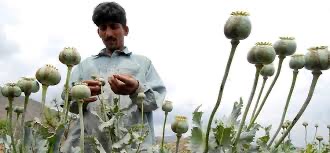As Balochistan becomes the world’s leading opium producer, violence spreads
Satellite images suggest that by the end of this year, Pakistan could surpass Afghanistan in drug production, with profits going to various terrorist groups in its southwestern province. Here, poppy fields grow as attacks multiply. Separatist groups and Pakistan’s military have been joined recently by the Islamic State with the local population caught in the crossfire.
Islamabad (AsiaNews) – Pakistan could outperform Afghanistan in opium production by the end of the year, after the Taliban imposed a ban on cultivation when they returned to power in August 2021.
Satellite images show the proliferation of new poppy fields in Pakistan’s southwestern province of Balochistan, where violence has increased over the past year.
Several pro-independence groups have carried out increasingly sophisticated terror attacks against Pakistani government targets over the past year, while Islamabad has intensified its military crackdown.
Government repression has especially affected civil society groups who want justice for the Pakistani army's indiscriminate actions and greater local control over natural resources. In Balochistan, people accuse the central government of selling off local minerals to foreign powers, like China and the United States.
In a recent report, Amnesty International revealed that Pakistani authorities are using Chinese and Western technology to monitor smartphones, especially targeting residents in Balochistan, Pakistan's largest and most resource-rich province, but where the poverty rate now stands at around 70 per cent.
The size of the poppy fields, many of which exceed five hectares, and their location near built-up areas suggest “unrestrained cultivation that has not ever been seen in Afghanistan, even in its peak years of opium production”, this according to David Mansfield.
“The Afghan [poppy] crop in 2025 is likely to be far exceeded by Pakistan,” said the expert on the Afghan opium trade who vetted the US counternarcotics programme, cited by the Telegraph.
Many Afghan farmers, deprived of their main source of income, have moved to Pakistan, bringing their opium cultivation expertise.
But the decision to move to Balochistan suggests that the profits from drug trafficking are ending up in the hands of local armed groups, including the Balochistan Liberation Army (BLA), the Balochistan Liberation Front (BLF), and the Balochistan Republican Army (BRAS).
Although the armed insurgency dates back to the late 1940s, when Pakistan gained independence, the last nine months have seen a resurgence of violence, compounded by attacks by the Islamic State, which claimed responsibility for a suicide bombing on 3 September in Quetta, the provincial capital, in which 15 people were killed and 30 wounded.
The blast occurred in the parking lot of a stadium where hundreds of members of the Balochistan National Party (BNP) had gathered to commemorate the death of their founder.
For the province, this is new, since jihadi militants had usually avoided targeting the local population.
The BNP is among the opposition parties fighting for greater rights and economic investment for the Baloch people.
In recent days, several party leaders have called for a province-wide strike in response to the attack. But they have also faced repression from Pakistani authorities – at least 100 people, including local politicians and activists, have been arrested, according to local sources.
Several observers believe the situation is likely to worsen. Due to the Pakistani government's crackdown, the BNP has seen its recruitment base expand, increasingly involving women and young people in its attacks.
For Balochi nationalists, foreign investment in the province is considered a legitimate target in their struggle for independence.
For their part, foreign powers, like the United States, have blacklisted the BNP and its Majeed Brigade, its most violent unit, which should pave the way for local projects, but ordinary Balochis continue to see no improvement.
A decade after the launch of the China-Pakistan Economic Corridor (CPEC), for example, the Balochis have reaped little benefit. Despite the construction of infrastructure and energy projects, unemployment and poverty remain very high.
21/09/2021 15:24







.png)










